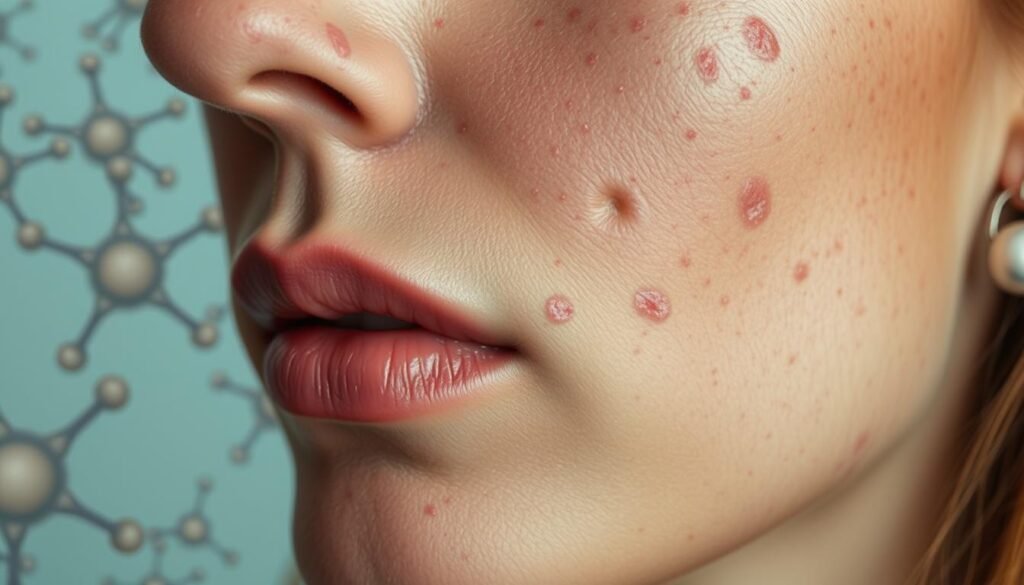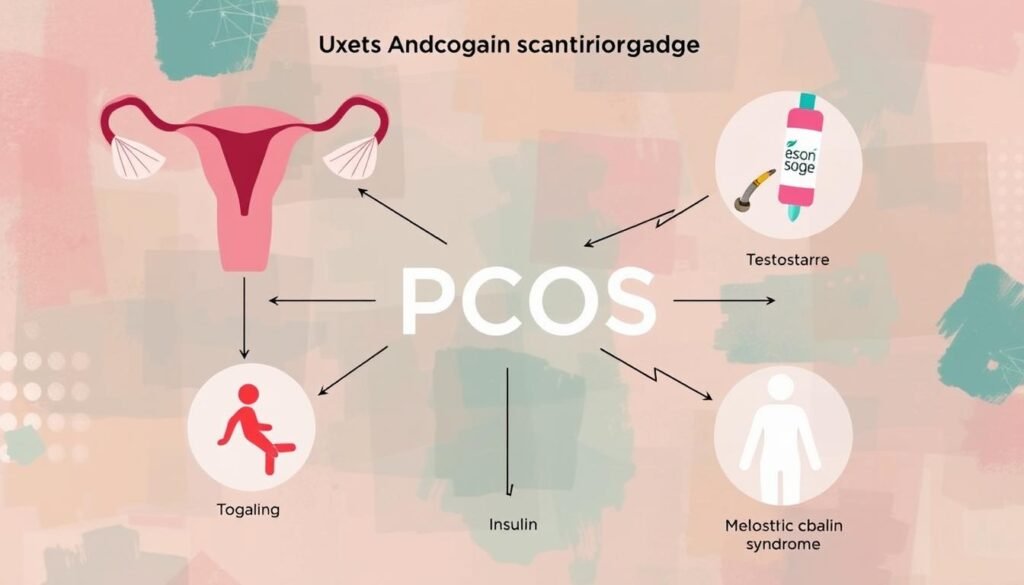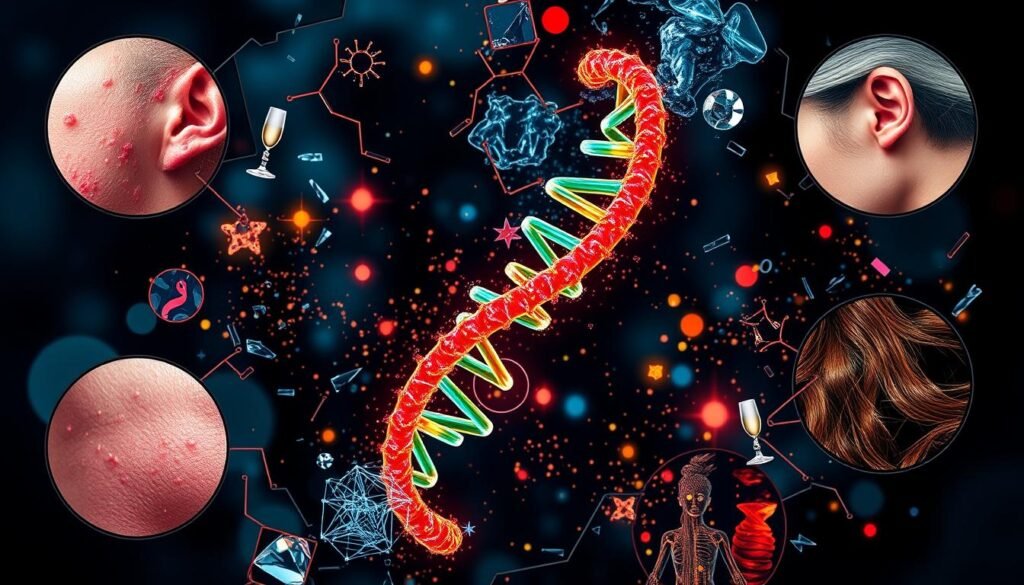Did you know up to 70% of women with polycystic ovary syndrome (PCOS) get acne? This fact shows how important it is to talk about too much androgen in PCOS. It’s especially crucial when looking at acne and hirsutism. The hormonal imbalance seen in PCOS can really affect a woman’s life. This includes both her physical and emotional well-being.
It’s key to understand how too much androgen and these symptoms are linked. This knowledge helps in handling them better. Experts from dermatology, endocrinology, and reproductive health come together to help. They make it easier for women to deal with acne and hirsutism. This piece sheds light on the issue of too much androgen in PCOS. It also covers ways and thoughts on improving life quality. For deeper insights, check this resource: hyperandrogenism and its implications.
Key Takeaways
- Excess androgen affects a significant portion of women with PCOS, often leading to acne and hirsutism.
- Management requires a comprehensive and multidisciplinary approach for effective treatment.
- Understanding the physiological pathways can aid in targeted therapies.
- Emotional and psychological support is critical in managing the symptoms associated with PCOS.
- Evidence-based recommendations inform clinical strategies to alleviate symptoms.
Understanding PCOS and Its Impact on Women
Polycystic Ovary Syndrome (PCOS) is a widespread hormonal disorder among women of childbearing age. It brings various physical and mental challenges. Symptoms include irregular periods, too much hair growth, acne, and gaining weight. Each symptom affects women’s daily life and mental health.
About 1 in 10 women in the United States have PCOS. This shows the importance of spreading the word about it. PCOS’s complex symptoms can lead to serious health issues if not managed. These include infertility, metabolic syndrome, and a higher risk of heart disease.
Learning about PCOS is key for those who have it and for doctors. Spotting the symptoms early can help manage the risks. Understanding PCOS allows women to take steps to control their symptoms. This can greatly improve their life quality.
| PCOS Symptoms | Associated Effects | Long-term Risks |
|---|---|---|
| Irregular Menstrual Cycles | Infertility, Hormonal Imbalances | Endometrial Cancer Risk |
| Excessive Hair Growth | Psychological Distress, Low Self-esteem | Social Anxiety Disorder |
| Acne | Skin Issues, Emotional Distress | Depression and Anxiety |
| Weight Gain | Metabolic Issues, Insulin Resistance | Type 2 Diabetes |
What is Excess Androgen in PCOS?
Excess Androgen in PCOS affects many women across the globe. It starts with understanding what hyperandrogenism means. This refers to high levels of androgens, like testosterone, leading to health issues. In both men and women, androgens are important. However, too much can cause problems.
Defining Hyperandrogenism
Hyperandrogenism in PCOS means having more androgens than normal. This can make a woman’s periods irregular. It can also cause acne and more body hair. Spotting these signs early is crucial for one’s health and fertility.
How Androgen Levels Affect the Body
High androgen levels in PCOS affect looks and health. For instance, too much testosterone can stop eggs from forming correctly. This can lead to infertility in women with PCOS. High androgens also link to insulin resistance, making PCOS symptoms worse. Balancing these hormones can help treat PCOS. More on this can be found here.

Hyperandrogenism Symptoms to Watch Out For
Women with hyperandrogenism may face symptoms that impact their life. Early recognition of these symptoms is key. The two main signs we’ll discuss are acne and hirsutism, which are due to hormonal imbalances.
Acne and Skin Changes
Acne linked to PCOS is usually worse than typical teenage acne. High androgen levels cause more oil, blocking pores. Ladies might also see their skin texture change or become oilier. These skin issues can hurt how they feel about themselves. It’s important to know how hyperandrogenism affects the skin to tackle these problems.
Hirsutism and Hair Loss
Hirsutism in PCOS means too much hair growth in areas like the face, chest, and back. It’s due to high androgen levels and can make one feel really bad. Hair loss or thinning might happen too. Catching these signs early can lead to actions that improve well-being.
For more information on managing these symptoms, including treatment choices, visit this resource.
Causes of Excess Androgen in PCOS
Looking closely at PCOS reveals it’s linked to hormonal imbalance. This trouble with hormones leads to more androgens in the body. Both genetic and environmental factors add to the problem, making the syndrome more complex.
Hormonal Imbalances Explained
Elevated androgen levels are a key sign of PCOS, often due to insulin resistance. This condition makes the ovaries produce extra testosterone. It can cause issues like acne and unwanted hair growth.
Women with PCOS might also see shifts in hormones like LH and FSH. These changes can disrupt ovulation and overall hormonal balance.
Genetic and Environmental Factors
Research shows that genes can affect your risk of having PCOS. If it runs in the family, you’re more likely to get it. Things like our diet and stress levels also play a part.
Eating lots of sugar, for example, can make insulin resistance worse. This makes the hormonal imbalance and high androgen levels continue.

Analyzing Hormonal Imbalances in PCOS
For women facing polycystic ovary syndrome (PCOS), understanding hormonal imbalances is essential. Identifying and checking high testosterone levels is key in this evaluation. High testosterone can change many parts of a woman’s health, both physically and emotionally.
Understanding High Testosterone Levels
High testosterone in women can cause various symptoms, some like those of PCOS. These include uneven menstrual cycles, hair growth in unusual places, and acne. Spotting these signs is vital for a correct assessment of their hormonal health.
The Role of Insulin Resistance
Insulin resistance plays a big role in hormonal imbalances. It affects testosterone levels, often leading to increases seen in PCOS. Women with this condition might make more androgens, worsening PCOS symptoms.

Seeing how these issues link together aids in grasping the complex hormonal profile in PCOS women. By examining these imbalances, doctors can create treatments that really match their patients’ needs.
Treatment Options for Excess Androgen in PCOS
Handling high androgen levels in PCOS means using both medicine and life adjustments. People with these hormone issues can get better with different treatments that fit them.
Medications and Hormonal Therapies
Medicines are key in treating high androgen in PCOS. Some main choices are:
- Combination Birth Control Pills: These regulate hormones and help with problems like irregular periods and acne.
- Spironolactone: This drug lowers hirsutism and acne by blocking androgens.
- Progestin Therapy: It’s used for menstrual cycle regulation and to keep the endometrium healthy.
- Metformin: Helps make the body more responsive to insulin, aiding in ovulation control.
For more on these treatments, people can look into verified medical sources about PCOS treatments.
Lifestyle Changes and Natural Remedies
Adding lifestyle adjustments to PCOS treatments offers big benefits. Healthier living can improve hormone balance and decrease symptoms by:
- Regular Exercise: Physical activity is good for weight and insulin management.
- Balanced Diet: Eating right with attention to food types and amounts helps.
- Weight Loss: Losing a little weight can make a big difference in symptoms and hormone levels.
- Stress Management: Yoga and meditation help with emotional and hormonal well-being.
These lifestyle changes are not only good for PCOS but also for overall health. You can find more on lifestyle’s role in PCOS at educational sites about PCOS management.
| Treatment Type | Examples | Purpose |
|---|---|---|
| Medications | Birth Control Pills, Spironolactone | Regulate hormones, reduce symptoms |
| Lifestyle Changes | Diet, Exercise, Stress Management | Enhance overall health, balance hormones |
Managing Acne Related to Excess Androgen
People dealing with PCOS acne need special skincare. Choosing the right routines and products helps a lot. It makes skin smoother and reduces pimples. Use gentle cleansers, special treatments, and moisturizers that keep pores clear.
Skincare Routines and Products
Sticking to a skincare routine is key for acne control. Here are the steps to follow:
- Cleanser: Pick a sulfate-free cleanser with salicylic acid or benzoyl peroxide to open pores.
- Toner: Choose alcohol-free toners with witch hazel to calm the skin.
- Treatment: Use products with retinoids. They prevent pimples and make skin smoother.
- Moisturizer: Go for non-comedogenic moisturizers. They hydrate without causing acne.
- Sun Protection: Wear broad-spectrum sunscreen every day to safeguard against sun damage.
Gentle, non-irritating products are best for healthy skin and reducing acne. Formulas made for acne-prone skin are most effective.
Consulting Dermatologists for Solutions
Seeing a dermatologist opens up more options for handling acne. They offer personalized plans, which may include:
- Prescription Medications: Dermatologists sometimes prescribe special meds for tough cases.
- Chemical Peels: These treatments take off dead skin and lessen scars, leading to clearer skin.
- Laser Therapy: This non-invasive approach targets acne’s roots and improves skin looks.
Working closely with a skin expert helps in managing PCOS acne better. You can get more tips here. These tips include effective treatments and advice.
Dealing with Hirsutism in PCOS
Hirsutism affects many women with PCOS. It changes how they look and feel about themselves. It’s crucial to find the right treatments.
Hair Removal Treatments and Techniques
Many options exist for controlling unwanted hair growth. Some treatments include:
- Laser hair removal: This reduces hair over time by targeting the follicles.
- Electrolysis: Electrical currents destroy hair follicles permanently.
- Topical treatments: Creams with eflornithine can slow hair growth when used regularly.
Other methods like shaving, waxing, and threading offer quick fixes. Many women mix methods to match their skin’s needs and personal choice.
Emotional Support and Counseling
Hirsutism in PCOS can be tough emotionally. Having support from loved ones or groups helps. Counseling might ease anxiety or sadness linked to hirsutism. Therapists focus on improving self-image and happiness.
Conclusion
Women with PCOS deal with high androgen levels. This can lead to many symptoms that hurt their health and happiness. Knowing the signs and how to manage high androgen is key to effective treatment. We’ve looked at ways to manage this, like hormone therapies, lifestyle changes, and skincare routines for acne and hirsutism.
It’s important to take charge of this condition. Doing so can make health and life better. Always seek advice from healthcare professionals. They can give treatment plans tailored to individual needs. This PCOS treatment overview shows that with the right care, women can handle their symptoms and the challenges of PCOS well.
Understanding excess androgen in PCOS helps women make smart health decisions. With the right therapies and support, they can feel more confident and in control. Starting to manage PCOS is a step toward better wellness and accepting oneself.